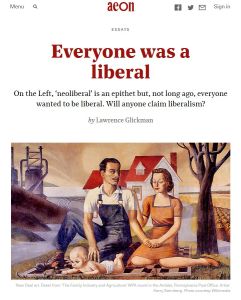Join getAbstract to access the summary!

Join getAbstract to access the summary!
Lawrence Glickman
Everyone Was a Liberal
On the Left, ‘neoliberal’ is an epithet but, not long ago, everyone wanted to be liberal. Will anyone claim liberalism?
Aeon, 2016
What's inside?
The political term “liberalism” has shifted in meaning since the start of the 20th century.
Recommendation
In this dissection of a common and often-times conflicting term in the United States’ political history’s lexicon, author and professor Lawrence Glickman explores in detail the term “liberalism.” Glickman explains how both Republicans and Democrats have at one time or another claimed themselves to be liberals. He further describes the role, response and current status of the word. getAbstract recommends this analysis to anyone who wants to dive deeper into how definitions change in American politics.
Summary
About the Author
Lawrence Glickman, PhD, is a history professor at Cornell University. His is the author of Buying Power: A History of Consumer Activism in America and A Living Wage: American Workers and the Making of Consumer Society.

















Comment on this summary